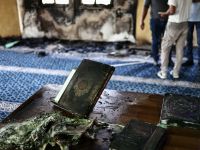Palestinian leader Yasser Arafat and Israeli Prime Minister Ehud Barak pledged Friday to work together to end Middle East violence after Russian President Vladimir Putin took the tattered peace process in hand.
The breakthrough came after Putin interrupted a two-hour Kremlin summit with Arafat to telephone Barak and then stepped back to watch as the two bitter rivals inched towards a compromise in the call from his private office.
Upbeat Kremlin officials declined to reveal the details of the telephone diplomacy but Barak's office said immediately afterwards that Arafat had declared himself ready to work for peace.
"Chairman Arafat said he is committed to doing everything he could to put an end to the violence," Barak's spokesman David Baker told AFP.
Baker added that the two leaders had also agreed to reopen a security coordination office that was closed Thursday after a deadly attack in the Gaza Strip.
"The prime minister and Chairman Arafat agreed to maintain security cooperation at the field level and, in this regard, to renew the activities of the joint liaison offices," the Barak spokesman told AFP.
Arafat himself described as "very important" the dramatic telephone conversation with Barak, adding that Putin and the Israeli leader had also discussed "issues concerning violence on our territories and ways to stop the escalating conflict," Interfax said.
Shortly before flying out of Moscow late Friday, the Palestinian leader added that the involvement of Russia, a co-sponsor of the Middle East peace process, was "very important for ending the violence" and averting what he called "an explosion" across the region.
Breathing new life into the long-moribund peace process, Russian diplomatic sources told ITAR-TASS later that Israeli Foreign Minister Shlomo Ben-Ami would come to Moscow on a three-day working visit Monday.
The Israeli embassy confirmed that Ben-Ami was due in Moscow next week but said no specific dates had yet been set for the trip.
Russian sources said that Ben-Ami would fly to Moscow to seek further details of Russia's closely-guarded Middle East peace initiative.
Official information on the Russian peace plan remain vague, but diplomatic sources said it called for European Union, Middle East and Asian nations, especially China, to send representatives to the negotiation table.
However, a new round of talks would begin only after a ceasefire had been declared, while the talks would be given a specific deadline, Russian sources said.
"We've found that our ideas were met with understanding and that the two sides pledged to analyze our proposals," Deputy Foreign Minister Alexander Avdeyev said after the Putin-Arafat meeting.
Meanwhile, on the ground, the daily Palestinian-Israeli violence claimed two more lives Friday to bring the death toll to 272 since the Palestinian intifada was declared on September 28.
Israeli soldiers shot and killed a Palestinian in the northern West Bank town of Qalqilia, hospital officials said, while an Israeli was killed when his car came under fire from Palestinian gunmen near the West Bank town of Nablus, according to military officials.
And in a rally attended by thousands in Gaza City, militants from the Palestinian Islamic group Hamas claimed responsibility for a rush-hour bomb blast in the Israeli town of Hadera on Wednesday that killed two and sparked a storm of Israeli rage.
Back in Moscow, with Russia urgently seeking to reassert its all but invisible presence in the Middle East peace process, an impassioned Putin called on both Barak and Arafat to put civilian lives ahead of the land dispute.
Opening the Kremlin talks, Putin said he was "absolutely convinced of one thing. All of these meetings will be useless if we are first unable to limit the level of violence."
Putin said it was "unfortunate" his meeting with Arafat had "clouded by these tragic circumstances" -- a clear reference to the two-month spiral of violence in Israel and the Palestinian territories.
"Every victim is a blow to our heart," Putin said, describing the Palestinian leader as his "personal friend".
The Russian leader pressed Arafat to exploit his "personal input into the (peace) process, which seemed irreversible a few months ago."
Analysts suggested that Arafat had sought to use the talks with Putin to appeal to Russia to honor the Kremlin's long-standing support for the Palestinians.
For his part, Putin was thought to have used the Kremlin meeting to repair Russia's tattered credibility as a player in the Middle East after its conspicuous absence from last month's Sharm el-Sheikh summit in Egypt -- MOSCOW (AFP)
© 2000 Al Bawaba (www.albawaba.com)







